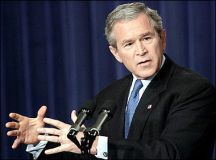Bush under increasing pressure to take more action in Darfur
WASHINGTON, June 9, 2005 (VOA) — Since the fighting in the Darfur region of Sudan escalated two years ago, hundreds of thousands people have been killed and more than two million people have fled their homes. The Bush administration is under increasing pressure to take more action to end the conflict.
 When U.S. President George W. Bush met South African president Thabo Mbeki at the White House June 1, Mr. Bush restated that genocide is taking place in Darfur and said the United States is doing what it can to stop it, including support for the African Union, or AU.
When U.S. President George W. Bush met South African president Thabo Mbeki at the White House June 1, Mr. Bush restated that genocide is taking place in Darfur and said the United States is doing what it can to stop it, including support for the African Union, or AU.
“Our government has put a lot of money to help deal with the human suffering there,” the president said. “Later on today, I’ll be meeting with the head of NATO, who has agreed to help the AU position troops so that humanitarian aid can reach these poor folks and hopefully bring stability as well as a breathing room so there can be a political agreement.”
But critics say that is not enough. The International Crisis Group, a non-governmental organization, says “for too long, the international approach to the crisis in western Sudan has been defined by tough rhetoric followed by half-measures and inaction,” which, the group says, ensures widespread attacks against civilians.
Emira Woods co-directs Foreign Policy in Focus, a think tank in Washington, D.C. She says it is crucial for the United States to take the lead in this situation.
“It is only the administration that can provide the political leverage needed at the U.N. Security Council for a changed mandate for the peacekeepers on the ground in Darfur. It is only the administration that can put pressure on the government of Sudan to stop the genocide, to stop the violence that they are perpetrating.”
Ms. Woods and at least 80 others – representatives from other advocacy groups, religious leaders and members of the U.S. Congress are urging the president to support action in the UN that would allow for a broader international force and mandate stronger civilian protection against government or government-sponsored troops.
But Sudanese officials deny they are behind the violence. Interior Minister Abdul Rahim Muhammad Hussein, in an interview for ABC Television.
– Q: Do you acknowledge the Sudanese military have killed innocent people in Darfur? A: I don’t think.
– Q: None?
– A: You mean, they mean to kill innocent people?
– Q: Yes.
– A: No. Definitely no.
Two years ago, black African groups staged a rebellion accusing the Sudanese government of oppression. The Janjaweed, an armed Arab militia group, retaliated with government support by burning entire villages, committing mass killings and rape.
Bill Fletcher of TransAfrica Forum, a Washington think tank, says more pressure has to be put on the Sudanese government.
“The Khartoum government of Al Bashir needs to be squeezed like one squeezes a lemon to get lemonade by his allies: by Russia and China,” he said. “Both sides absolutely have to understand that there has to be a political solution to this. The rebels in Darfur cannot be led to believe that by the elongation of talks that time is on their side. It is not on the side of the people of Darfur.”
Others advocate keeping the spotlight on the situation through high-level visits. U.N. Secretary General Kofi Annan recently visited refugee camps in Darfur, as did U.S. Under Secretary of State Robert Zoellick.
Meanwhile, time is running out for the smallest and weakest victims of the conflict. And experts say up to a million people could be killed this year unless something is done to end the violence.
